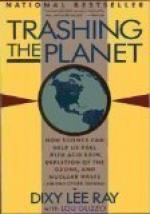|
This section contains 1,549 words (approx. 6 pages at 300 words per page) |

|
Radioactive pollution can be defined as the release of radioactive substances or high-energy particles into the air, water, or earth as a result of human activity, either by accident or by design. The sources of such waste include: 1) nuclear weapon testing or detonation; 2) the nuclear fuel cycle, including the mining, separation, and production of nuclear materials for use in nuclear power plants or nuclear bombs; 3) accidental release of radioactive material from nuclear power plants. Sometimes natural sources of radioactivity, such as radon gas emitted from beneath the ground, are considered pollutants when they become a threat to human health.
Since even a small amount of radiation exposure can have serious (and cumulative) biological consequences, and since many radioactive wastes remain toxic for centuries, radioactive pollution is a serious environmental concern even though natural sources of radioactivity far exceed artificial ones at present.
The problem of radioactive...
|
This section contains 1,549 words (approx. 6 pages at 300 words per page) |

|


